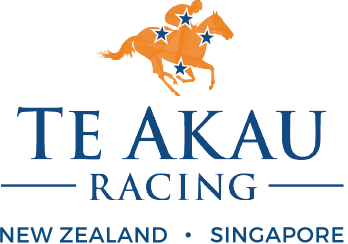 Swedish jockey Per-Anders Graberg shows his style on Wairoa Cup winner Whangaehu.
Swedish jockey Per-Anders Graberg shows his style on Wairoa Cup winner Whangaehu.New Zealand jockey ranks continue to expand internationally, with the latest addition champion Swedish rider Per-Anders Graberg, who rode his first local winner last weekend.
Graberg arrived in the country with little fanfare at the start of the month, belying a record of more than 2,000 wins, 12 jockeys’ premierships across Scandinavia and success in Europe, Dubai and North America.
A natural lightweight whose personal fitness and professional diligence make a perfect foil to his 49 years, Graberg took just a dozen raceday rides to break his duck in New Zealand on Waverley stayer Whangaehu in Sunday’s Affco NZ Wairoa Cup at Hastings. That has put him in the reckoning to ride the Bill Thurlow-trained gelding in the country’s richest staying race, the $500,000 Auckland Cup on March 9.
With the northern winter forcing the closure of racing in Scandinavia for four months from mid-December, the notion to try his luck Down Under began when Graberg crossed tracks with Cambridge trainer Tony Pike’s former racing manager Dean Williams while the latter was visiting Sweden in September.
“Dean mentioned there might be some opportunities in New Zealand, which sounded like a good idea to me and the plan was to be here by Christmas, but it took longer than expected to get the paperwork completed,” Graberg told RaceForm earlier this week.
Williams’ links to the Pike stable and to The Oaks Stud, which is manager by his father Rick, led to his first New Zealand race rides in the blue and white colours of stud owner Dick Karreman. On just his second day’s riding, at Te Rapa’s Legends Day, he partnered the Pike-trained, The Oaks home-bred filly Vera Rose into third in the inaugural Sir Patrick Hogan Karapiro Classic.
The following week it was a matter of right place, right time when his manager, former leading jockey Michael Coleman, secured the mount on leading Wairoa Cup prospect Whangaehu.
“I got a call from Bill Thurlow wanting to book Craig (Grylls) for the ride, but with Gryllsy not going to Hastings, I suggested Per-Anders,” Coleman recalled. “It was good of Bill to take up the offer and even better to see the horse win.
“Getting that first win was a big step in the right direction and should have helped Per-Anders get more rides. This Saturday at Matamata he’s booked for Poetic Champion in the Slipper and Lotus in the Breeders’ Stakes, so it’s good to be riding in those sorts of races.”
Graberg brings an interesting perspective to race-riding in this part of the world, with Scandinavian racing taking a particularly strong stand in the matter of whip use. In Sweden jockeys are allowed to carry whips, but they can only be used as a guiding tool when required.
“The rules are very strict,” Graberg said, “you are not allowed to take your hands off the reins and you definitely can’t hit the horse, not even a slap down the shoulder.
“You are allowed to use the whip as an aid if your horse looks like interfering with other runners, that’s acceptable, but if you so much as touch your horse with the whip it is disqualified and the jockey is suspended.”
Norway, which along with Sweden and Denmark makes up the main Scandinavian racing jurisdictions, made the call several years ago to ban whips completely in all but two-year-old races, inspiring Graberg’s well-publicised quote “I’d rather ride without my breeches than without my whip”.
As he reminded local race-watchers when he did not draw the whip in his win on Whangaehu at Hastings last weekend, Graberg is not a jockey with a high dependency on the whip, but he still says a middle-ground position is necessary.
“The jockeys have attempted to get the whip back but with no success, which is not good when you realise how many horses will not be competitive without some sort of encouragement. I don’t use the whip a lot, but I still believe as a jockey you need to be allowed to use it to some degree.
“The jockeys have argued that the sport is getting smaller because of the whip restrictions, but the officials say that is the result of other factors, which of course we don’t agree with.
“There is nothing you can do to change the horse’s mind if it doesn’t want to compete, and really it isn’t fair racing any more.”
Grabert believes New Zealand whip rules as they currently stand are fit for purpose, which in flat races allow no more than five strikes in non-consecutive strides before the final 100 metres, and judicious use in non-consecutive strides from that point. The rules also allow for jockeys to be penalised should they use the whip in what is considered an unnecessary manner on a horse that is out of contention.
“I think your rules are good, they still allow a jockey to urge a horse when necessary and everyone gets a fair chance. No-one wants to see a horse being whipped unnecessarily, that’s not on, but we still need to be able to use whips.”
Graberg is optimistic about making his mark locally over the next few weeks before he heads home for the new season, and if he feels it’s warranted, he would be keen to consider a longer stint next southern summer.
“My wife and two daughters were hoping to come down with me, but with the delay and the shorter time they decided not to. I’ve really enjoyed myself, and while it’s been a learning experience getting used to your tracks and assessing the horses, I’m glad I made the effort.”
Fitness is a big part of Graberg’s lifestyle, dating back to his early teenage years as a successful alpine skier and more recently as a runner and cyclist.
“I run seven to 10 kilometres every day, I enjoy a round of golf (handicap 10), and back home I compete in the bike trials that take place in June every year. There’s a 315-kilometre race around one of Sweden’s biggest lakes and my goal was to complete it in under 10 hours, so I was very pleased when I did it in nine hours, 55 minutes!”










